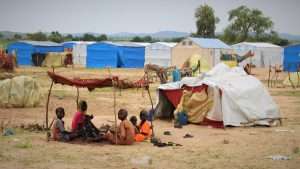Swedish and Belgian leaders to act tough following Brussels attack

Sweden and Belgium’s leaders have called for less leniency on illegal migration following the Brussels attack, reports The National News, October 18.
The European continent saw terror earlier this month as an ISIS fanatic killed multiple people in the Belgian capital and a radical killed 4 people in France’s northern town of Arras.
Sweden’s Prime Minister Ulf Kristersson stressed the need for having more powers to send illegal immigrants back to their country of origin and said that, “We need to protect our European borders,”.
The terrorist responsible for the killings in Belgium was named as Abdelsalam Lassoued, a Tunisian man who served a prison sentence in Sweden from 2012 to 2014 and originally arrived in Europe in 2011 via the Italian island of Lampedusa.
He then migrated to Belgium despite an unidentified source saying in 2016 that he wanted to fight for ISIS . Although his asylum application to the country was thrown out in 2020, he slipped through the net due to the authorities’ incompetence.
READ:Libya: Sacked diplomat to Belgium detained
Lassoued, 45, killed two Swedish football fans who were in Brussels for their match against Belgium in a Euro Qualifier.
Before the terror attack, the gunman claimed in a social media post that he targeted Swedes as “revenge in the name of Muslims.”
Belgian Prime Minister Alexander De Croo said Lassoued continued to reside in Belgium due to breakdown in communication between the city in which he lived in and the country’s asylum office.
De Croo stated “This person had indeed received an order to leave the territory, then went underwater, we need, as EU member states additional tools, additional possibilities to do that. It is quite clear that just gently asking is not enough.”
READ: Disputes break out in Strasbourg over EU-Tunisia migrant deal
Whilst Sweden’s Prime Minister didn’t blame Belgium, opposition politicians in the country promptly criticised the government for failing to act.
The Belgian capital has been the victim of at least four terror attacks in the past decade including the tragedy committed this month. In 2014 a Jewish Museum was attacked by Islamist extremists, in 2016, jihadists targeted Brussels’ main commercial airport and year later, a terrorist bomb caused an explosion in a train station.
Whilst tackling Islamic extremism is understandable, many will fear that stricter laws on migration will target those from the Middle East and North African region, particularly those from Tunisia and neighbouring countries such as Algeria as well as Morocco.
The EU signed a pact back in July with Tunisia in which the bloc gave the Maghreb country financial aid to help address their lacklustre economy as well as helping them establish stronger border controls.
The deal was met with a degree of criticism as migration from North Africa to European shores increased, implying the pact in question lacks effectiveness.
During a fiery debate amongst members of the European Parliament regarding the controversial agreement last month, Dutch MEP Tineke Strik said, “The deal has only led to more repression, more deaths, and even more migration”.
The National News
Want to chase the pulse of North Africa?
Subscribe to receive our FREE weekly PDF magazine














